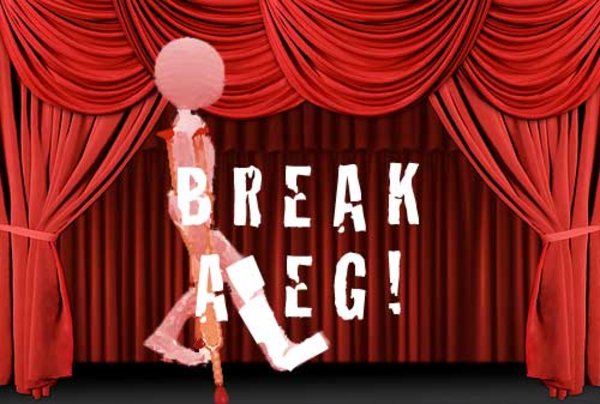- 用心翻譯每一天

聯(lián)系我們
全國統(tǒng)一服務熱線:
電話:021-58446796
公司QQ:732319580
郵箱:daisy.xu@easytranslation.com.cn
網(wǎng)址:www.jpgfs2012.com
地址:上海浦東金橋開發(fā)區(qū)金豫路700號6號樓1樓
譯銳小編: 為什么在演出人員/表演者上臺表演之前,我們要和對方說break a leg?break a leg是表示摔斷腿的意思嗎? "Break a leg" is one piece of performer lingo that has leaked into the mainstream. Originally, it was used by actors and musicians to wish their colleagues good luck before going on stage. Today, even people outside the entertainment world know the meaning of the idiom, but few people probably know where it comes from. “Break a Leg”是演出人員所說的一句行話,目前這句行話已成為主流。最初,“break a leg”這句話是演員和音樂人祝即將上臺表演的人好運。如今,即使是娛樂行業(yè)以外的人也了解了這一習語的含義。但是,關于這個習語的出處,了解的人卻知之甚少。 The common story behind "break a leg" is that it began as a replacement for "good luck"—a phrase that's actually considered bad luck if spoken out loud in theater. The superstition is real, but it doesn't explain why actors started wishing each other bodily harm instead. 關于“break a leg”的來歷,最初始于“good luck”的替代說法-人們認為,如果在劇院大聲喊出“good luck”這句話,則反而會招致壞運氣。這個迷信確實存在,但卻沒有解釋為什么演員們用希望對方身體受傷這樣的表述來祝其好運。 According to Grammarist, the saying in its modern form originated as an in-joke in theaters in the 1920s. This theory states that rookie performers waiting in the wings teased the well-seasoned pros by telling them to "break a leg," which would have allowed the understudies to take their place. 根據(jù)語法學家的介紹,這個現(xiàn)代形式的習語始于20世紀20年代劇院圈子里的一個笑話。這個笑話講的是,在舞臺兩側(cè)等待的新手演員戲弄經(jīng)驗豐富的老演員,告訴他們要摔斷腿,這樣新手演員就可以取代他們來進行表演。 in the wings :舞臺兩側(cè) Another theory traces the idiom even further back in time. In Old English, breaking a leg could have described someone bending a leg, as in a curtsy or bow. Instead of jokingly wishing someone to get too injured to perform, this version of the phrase could have been a way to encourage actors to make it to the end of a successful show. 另一個關于這一習語的說法更為久遠。在古英語中,breaking a leg可能是指人在行屈膝禮或鞠躬時彎曲一條腿。與開玩笑地希望某人受傷以至于無法表演不同,這個說法是鼓勵演員為成功演出完美畫上句號。 Some other possible etymological explanations relate to the audience members rather than the performers. In Elizabethan England, spectators would sometimes smash their seats—including the chair legs—on the ground in lieu of applause. Audiences in Ancient Greece were known to stomp their feet instead of clapping their hands (though hopefully not to the point of breaking them). 其他可能解釋這一習語的語源學則和觀眾而非表演者有關。在伊麗莎白時期的英格蘭,觀眾有時會通過猛砸座椅-包括椅子腿來替代掌聲。在古希臘,觀眾會通過跺腳而非拍手來表示掌聲(盡管觀眾并不想跺腳跺到骨折)。 etymological:語源學 Regardless of its possibly sincere beginnings, "break a leg" would eventually grow into a sarcastic theater joke. The modern definition of the phrase was printed in a 1948 issue of the Charleston Gazette, likely after it had been already used by performers for years. It appears in a list of acting superstitions: "Another is that one actor should not wish another good luck before a performance but say instead 'I hope you break a leg.'" 盡管習語的初衷可能都發(fā)自內(nèi)心,“break a leg”最后成為了一個具有諷刺意味的舞臺玩笑。這個短語的現(xiàn)代定義被印刷在了1948年版的《查爾斯頓新聞報》上,盡管這個短語已經(jīng)被演員們使用了很多年。這個短語出現(xiàn)在了有關演出迷信的清單中:“一個演員不能在另一個演員上臺表演前,對對方說“good luck”,而是應該說‘I hope you break a leg’。” There is no one verifiable origin of the saying, and even some performers may not be aware of the reasons for repeating it. If you're new to the stage, just know that you shouldn't take the seemingly insulting phrase personally. 關于短語的起源并沒有得到驗證,甚至有些演員也不清楚這個短語被一再使用的緣由。如果你是舞臺新人,要記住,這個看似無禮的表達其實并沒有冒犯的意思。 take (something) personally:被冒犯、被攻擊 來源:Mental Floss 編輯&翻譯:Sarah